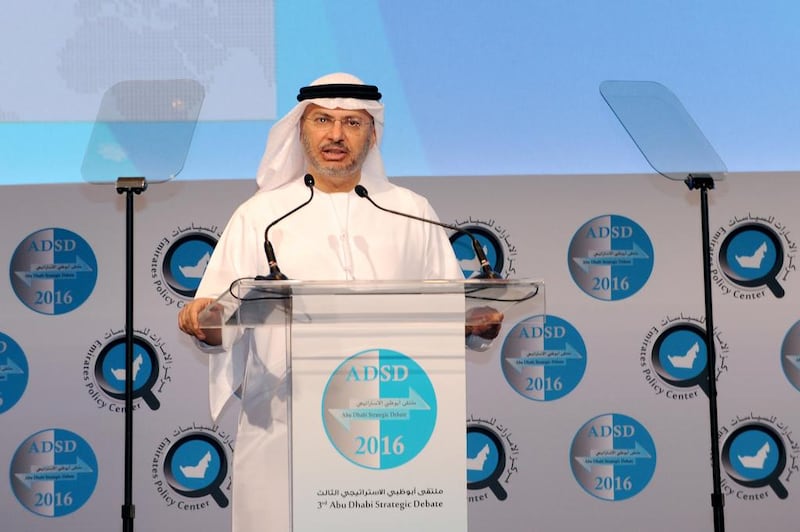ABU DHABI // The result of last week’s US presidential elections must not be allowed to compromise America’s role in the world, Minister of State for Foreign Affairs Dr Anwar Gargash says.
In an opening address to the third Abu Dhabi Strategic Debate, the minister said the impact of last week’s vote, in which Republican Donald Trump was elected 45th president of the US, was felt most acutely in the Arab world, which is no stranger to instability.
“Events of the past week have once again demonstrated that politics can be extremely unpredictable,” Dr Gargash said on Sunday.
“There are certainly more exclamation marks than answers, and the future of America’s foreign policy is a cause for acute speculation and concern. This follows Brexit (the UK’s decision to leave the European Union) and the rise of anti-establishment and populist sentiments in many parts of the world.”
The minister said the world faced a fluid and complex international situation in need of direction and stability.
“The world we live in is one of growing uncertainty, in the political, economic and social arenas,” Dr Gargash said. “While we do not yet know how the foreign policy of the new American administration will affect our region, we can be certain of one thing: American global engagement remains crucial to ensure a stable, peaceful and predictable international system.”
Last week’s election of Mr Trump meant great uncertainty until the president revealed his foreign policy agenda but Dr Gargash said America’s role in the global community was essential to stability and its withdrawal, especially from the Gulf, would be bad news.
“Despite the fact that we live in an increasingly multi-polar world, Washington’s weight and influence remains more important than ever,” Dr Gargash said. “Following weakened American engagement in the region – which many feel has created a disconcerting vacuum – it looks like we will have to wait a little longer until president-elect Trump’s approach becomes clearer.
“It is essential there is an over-arching strategy rather than isolation. In short, America’s engagement is positive and its withdrawal and disengagement is counter-productive.”
Dr Gargash said that the Middle East’s stability could not depend exclusively on the US as Russia, China, India and the European Union also have important role to play.
“This is why our foreign policy seeks to consolidate relations with these actors,” he said.
“Even by the standards of the Middle East, these are exceptional and difficult times. Regional crises are endangering the very existence of nation-states and tearing apart the fragile fabric of many Middle Eastern societies. Ugly sectarian politics is replacing more rational, national paradigms.
“It is therefore incumbent upon Middle Eastern states, in collaboration with our friends and partners in the international community, to engage in and foster regional solutions to regional problems.”
Dr Mohammed Al Sabah, Kuwait’s former deputy prime minister and minister of foreign affairs, said uncertainty will prevail next year.
“We don’t know yet what the final shape of the geopolitical and geo-strategic scene will be globally,” he said.
He voiced concern over Mr Trump’s foreign policy. “I am rarely pessimistic,” he said. “Nevertheless, we are to show our friends in Washington what our priorities and interests are. We want to reduce Iran’s meddling in the region . Especially in Iraq, Iran shouldn’t be given a free hand to implement its sectarian policies.”
For Dr Ebtesam Al Ketbi, president of the Emirates Policy Centre, which organised the event, GCC countries should refrain from linking themselves to global powers such as the US.
“The problem is not is the US president but what GCC countries want which is unclear,” she said. “They did not agree upon this among themselves. We have to think rationally so the opportunity for the GCC is to agree on one standpoint.
“Whether Trump or another, you cannot continue with the US playing the same role, and I believe this reality has pushed them to diversify their partnership with countries like China and Russia because you cannot put all your eggs in one basket.”
cmalek@thenational.ae






